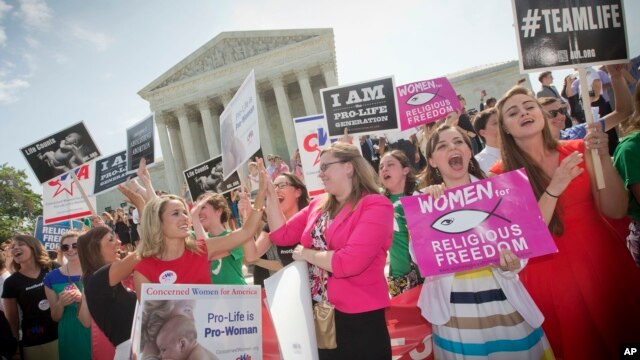
Demonstrator react to hearing the Supreme Court's decision on the Hobby Lobby case outside the Supreme Court in Washington, June 30, 2014.
In one of the most closely watched cases of the year, the U.S. Supreme Court ruled on Monday that American business owners with religious objections may deny contraceptive coverage as part of universal employee health insurance now required by law.
The decision is seen both as a landmark ruling in this nation's foundational guarantee of religious liberty for all, and at the same time a major setback to President Barack Obama's reform commonly known as Obamacare, a centerpiece of his presidency.
According to Scotusblog.com website, the court said that the government has failed to show that the mandate is the least-restrictive means of advancing its interest in guaranteeing cost-free access to birth control.
In the Burwell v Hobby Lobby case, the evangelical Christian owners of an arts-and-crafts chain refused to cover certain forms of contraception such as the morning-after pill in their employee health plan, arguing that would make them complicit in abortions.
The government and other opponents argued that such contraceptives do not induce abortions, and said that it was the employee's right to decide whether to use contraceptives, and which kind.
It is unclear how many women potentially are affected by the high court ruling.
The Hobby Lobby chain of arts-and-crafts stores is by far the largest employer of any company that has gone to court to fight the birth control provision. Hobby Lobby has more than 15,000 full-time employees in more than 600 crafts stores in 41 states.
The company is owned by the Greens, an evangelical Christian family who also own Mardel, a Christian bookstore chain.
Birth control mandate
In the 5-4 decision, the court said the ruling applies only to the birth control mandate and does not mean companies would necessarily succeed if they made similar claims against other insurance requirements, such as vaccinations and blood transfusions.
The court stressed that its ruling applies only to corporations that are under the control of just a few people in which there is no essential difference between the business and its owners.
Justice Samuel Alito wrote for a majority that included the Chief Justice John Roberts and Justices Antonin Scalia, Anthony Kennedy and Clarence Thomas. Justices Ruth Bader Ginsburg, Sonia Sotomayor, Stephen Breyer, and Elena Kagan dissented.
In the majority opinion, Alito indicated that employees could still be able to obtain the birth control coverage via an accommodation to the mandate that the Obama administration has already introduced for religious-affiliated nonprofits.
The accommodation allows health insurance companies to provide the coverage without the employer being involved in the process.
The case brought to the forefront thorny questions of religious freedom and reproductive rights, along with enduring politicking over the health care law, itself broadly upheld by the Supreme Court in 2012.
The nine-member court met for a final time Monday to release decisions in its two remaining cases before the justices took off for the summer.
Tricky legal questions
In determining the case, the Supreme Court had to consider two tricky legal questions.
One was whether for-profit corporations have a right to religious freedom similar to what the U.S. Constitution gives to citizens.
The other was, even if that's not the case, whether business owners' religious rights come before those of their employees.
The victory by Hobby Lobby could have wide-ranging implications, and may even give license to discrimination, said Caroline Frederickson of the left-leaning American Constitution Society.
Experts said the controversy is particular to America's system of employer-provided health insurance, and would not be an issue for business owners in a single-payer system in which the state provides health care services.
Poll results
A recent Reuters/Ipsos opinion poll found that a majority of Americans oppose letting employers, based on their religious views, exclude certain contraceptives from workers' insurance coverage.
The poll asked whether employers should be able to choose what forms of contraceptives their health plans provide based on their religious beliefs. Of those responding, 53 percent disagreed and 35 percent agreed. Of those surveyed, 12 percent said they did not know
The poll found that 40 percent strongly disagreed and 13 percent somewhat disagreed with the idea that employers should be able to choose what forms of contraceptives their health plans provide based on their religious beliefs.
It found that 20 percent strongly agreed and 15 percent somewhat agreed with the idea.
The Reuters/Ipsos poll of 10,693 people, conducted April 28-June 20, has a credibility interval of plus or minus 1.1 percentage point.
Union fees case
The Supreme Court also ruled Monday that in-home care workers in Illinois who are paid by the state are not similar enough to government employees to be compelled to pay union dues.
The court held on a 5-4 vote that plaintiff Pamela Harris and others who provide in-home care for family members and others with disabilities were not full-fledged public employees who could be forced to pay union dues to a public employees union.
The decision left intact the court's 1977 ruling in Abood v. Detroit Board of Education. That ruling said unions could collect such compulsory dues used for non-political activities under collective bargaining agreements. |
|
